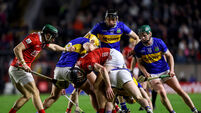Supporters of cleric demand US military pullout
Marking the two-year anniversary since US troops took control of Baghdad and toppled Saddam Hussein’s statue, supporters of a militant Shiite cleric filled the capital’s streets today and demanded that their American invaders go home, shouting “No! No, to Satan!”
About 5,000 protesters held a similar demonstration in the Sunni triangle city of Ramadi, reflecting a growing impatience with US-led forces trying to slowly hand over control to an infant Iraqi government.














